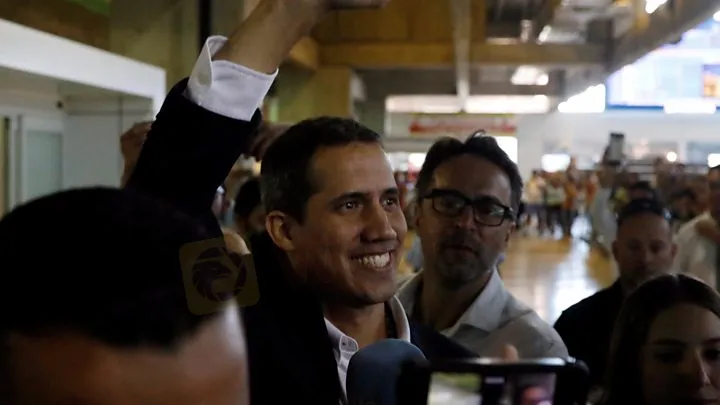简体中文
繁體中文
English
Pусский
日本語
ภาษาไทย
Tiếng Việt
Bahasa Indonesia
Español
हिन्दी
Filippiiniläinen
Français
Deutsch
Português
Türkçe
한국어
العربية
Venezuela blackout: Most of country in darkness for hours
Abstract:Image copyrightReutersImage caption Thousands of people had to walk home in the capital Caracas on
Image copyrightReutersImage captio
Thousands of people had to walk home in the capital Caracas on Thursday evening
Most of Venezuela has been hit by a continuing electricity blackout that began on Thursday afternoon.
The power cut plunged the capital Caracas into almost complete darkness during rush hour and has extended to the vast majority of the country.
The government of President Nicolás Maduro has blamed the opposition, accusing them of sabotage.
It comes amid heightened tensions over opposition efforts, backed by the US, to remove Mr Maduro from power.
Mr Maduro accuses opposition leader and self-declared interim president Juan Guaidó of trying to mount a coup with the help of “US imperialists”.
Venezuela crisis in nine chart
Venezuela's exodu
Supporters stand by Maduro
Mr Guaidó - who is backed by the US, most European and some Latin American countries - said the blackout was a matter of “chaos, concern and indignation” and “evidence of the usurper's inefficiency”.
Image copyrightAFPImage caption Caracas and most of the rest of the country have no power
“Light would return” once Mr Maduro was removed from power, he said.
US Secretary of State Mike Pompeo also weighed in, blaming the “Maduro regime's incompetence”.
“No food. No medicine. Now, no power. Next, no Maduro,” he tweeted.
Image Copyright @SecPompeo@SecPompeo
Report
Image Copyright @SecPompeo@SecPompeo
Report
The lack of electricity has caused flights to be diverted from the main airport in Caracas, where thousands of workers were forced to walk home.
Venezuela depends on its vast hydroelectric infrastructure, rather than its oil reserves, for its domestic electricity supply.
However, decades of underinvestment have damaged the major dams and sporadic blackouts are commonplace.
What's the background to Venezuela's political crisis?
The Maduro government is becoming increasingly isolated as more and more countries blame it for the economic crisis which is crippling the oil-rich country and which has prompted more than three million people to leave Venezuela.

Media playback is unsupported on your device
Media captionJuan Guaidó was greeted by thousands of supporters on his return on Monday
Mr Guaidó, who leads the opposition-controlled National Assembly, declared himself interim president on 23 January and has been at loggerheads with President Maduro ever since.
He has been recognised as interim president by more than 50 countries but Mr Maduro retains the support of his close allies Russia, Cuba and China among others.
Disclaimer:
The views in this article only represent the author's personal views, and do not constitute investment advice on this platform. This platform does not guarantee the accuracy, completeness and timeliness of the information in the article, and will not be liable for any loss caused by the use of or reliance on the information in the article.
WikiFX Broker
Latest News
ATTENTION! WARNING AGAINST FRAUD BROKERS
FOREX.com Partners with Kalshi for Event-Based Trading on US Election
Alameda Sues KuCoin to Reclaim $50M in FTX Asset Recovery Drive
Canadian Watchdog Warns Against Capixtrade
The impact of the U.S. presidential elections on gold and Forex prices
The Importance of Backtesting in Forex Trading
The Role of Moving Averages in Trend Trading
AI-Driven Fraud: Social Media Fraud Reportedly Soars 28%
HKEX to Open Riyadh Office in 2025, Strengthening Ties Between China and the Middle East
Hong Kong Exchange Pioneers Asia's First EU-Compliant Crypto Index
Currency Calculator


